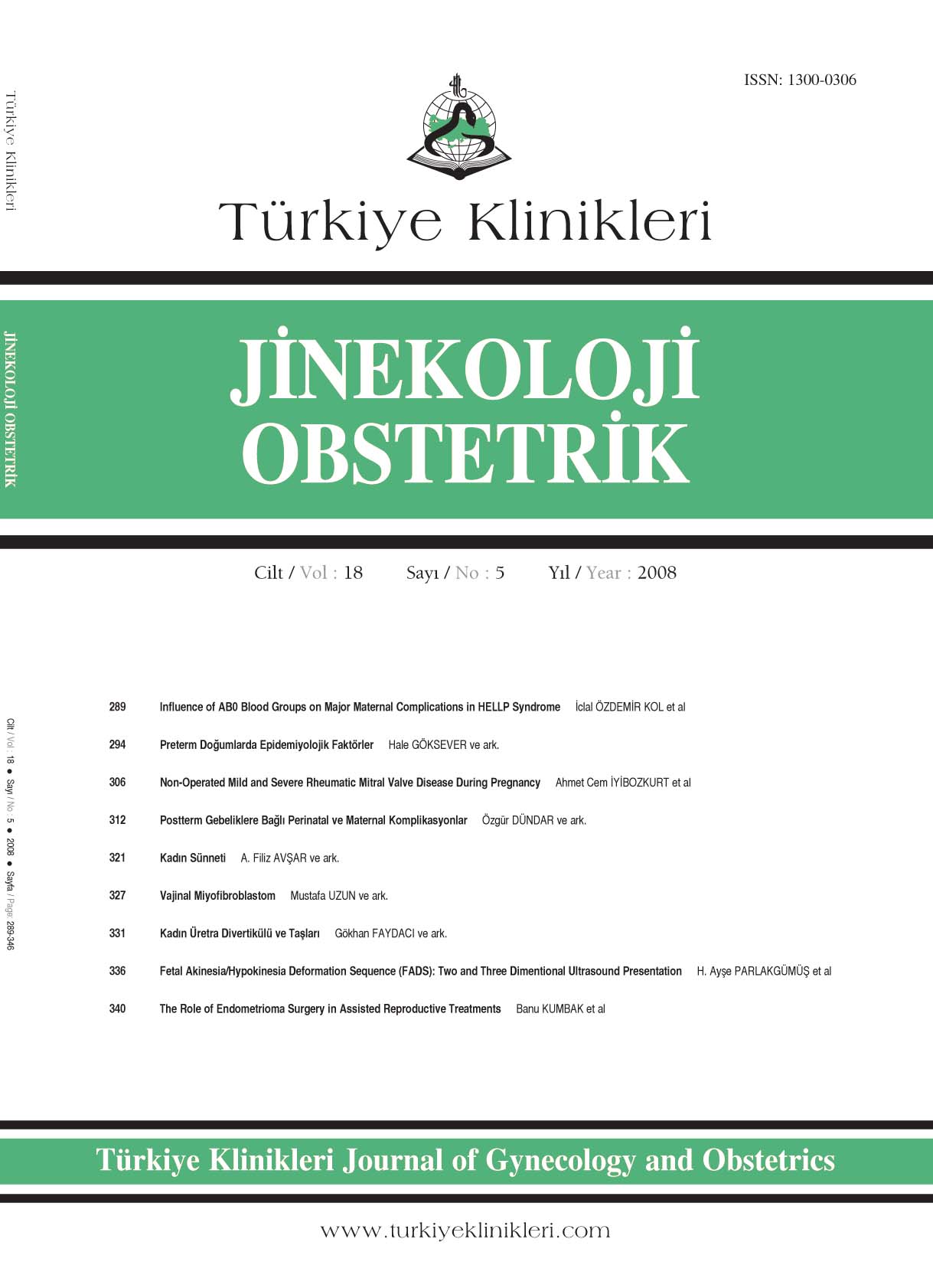Open Access
Peer Reviewed
ORIGINAL RESEARCH
2222 Viewed1083 Downloaded
Influence of AB Blood Groups on Major Maternal Complications in Hellp Syndrome
Hellp Sendromundaki Majör Maternal Komplikasyonlara AB Kan Gruplarının Etkisi
Turkiye Klinikleri J Gynecol Obst. 2008;18(5):289-93
Article Language: EN
Copyright Ⓒ 2025 by Türkiye Klinikleri. This is an open access article under the CC BY-NC-ND license (http://creativecommons.org/licenses/by-nc-nd/4.0/)
ABSTRACT
Objectives: The aim of this retrospective study was to determine the effect of the maternal blood groups on major maternal complications in women with Hemolysis, Elevated Liver Enzymes, and Low Platelet Count HELLP syndrome. Material and Methods: Maternal medical records of pregnancies complicated by HELLP syndrome between January 1996 and August 2006 were reviewed. Eighty-nine women with HELLP syndrome were included in the study and the patients were divided into 8 groups according to their blood groups: A Rh-positive (n=40), B Rh-positive (n=14), AB Rh-positive (n=9), 0 Rh-positive (n=20), A Rh-negative (n=2), B Rh-negative (n=0), and AB Rh-negative (n=2), 0 Rh-negative (n=2). The last 4 groups were removed from the study because of the small sample size. Results: There were no significantly respect to maternal age, parity, gestational age, initial and highest systolic blood pressure, hospital stay, hemoglobin, leukocyte count, platelet counts, prothrombin time, partial thromboplastin time, blood urea nitrogen, creatinine, alanine aminotransferase, aspartate aminotransferase, and lactic dehydrogenase in all groups. In the overall study population, the incidence of major maternal complications was 57.8%. The incidence of major maternal complications in HELLP syndrome was increased (71.4%) in B Rh-positive blood group in our study population. Conclusions: Our results may provide preliminary information that could be used to design future prospective studies to determine the influence of AB0 blood groups on major maternal complications in HELLP syndrome.
Objectives: The aim of this retrospective study was to determine the effect of the maternal blood groups on major maternal complications in women with Hemolysis, Elevated Liver Enzymes, and Low Platelet Count HELLP syndrome. Material and Methods: Maternal medical records of pregnancies complicated by HELLP syndrome between January 1996 and August 2006 were reviewed. Eighty-nine women with HELLP syndrome were included in the study and the patients were divided into 8 groups according to their blood groups: A Rh-positive (n=40), B Rh-positive (n=14), AB Rh-positive (n=9), 0 Rh-positive (n=20), A Rh-negative (n=2), B Rh-negative (n=0), and AB Rh-negative (n=2), 0 Rh-negative (n=2). The last 4 groups were removed from the study because of the small sample size. Results: There were no significantly respect to maternal age, parity, gestational age, initial and highest systolic blood pressure, hospital stay, hemoglobin, leukocyte count, platelet counts, prothrombin time, partial thromboplastin time, blood urea nitrogen, creatinine, alanine aminotransferase, aspartate aminotransferase, and lactic dehydrogenase in all groups. In the overall study population, the incidence of major maternal complications was 57.8%. The incidence of major maternal complications in HELLP syndrome was increased (71.4%) in B Rh-positive blood group in our study population. Conclusions: Our results may provide preliminary information that could be used to design future prospective studies to determine the influence of AB0 blood groups on major maternal complications in HELLP syndrome.
ÖZET
Amaç: Bu retrospektif çalışmada amaç Hemolysis, Elevated Liver Enzymes, and Low Platelet Count HELLP sendromundaki majör maternal komplikasyonlara AB0 kan gruplarının etkisini araştırmaktır. Gereç ve Yöntemler: Ocak 1996 ile Ağustos 2006 tarihleri arasında HELLP sendromu ile komplike olmuş gebeliklerin kayıtları değerlendirildi. Çalışmaya 89 HELLP sendromlu hasta alındı. Hastalar kan gruplarına göre 8 gruba ayrıldı: A Rh-pozitif (n=40), B Rh-pozitif (n=14), AB Rh-pozitif (n=9), 0 Rh-pozitif (n=20), A Rh-negatif (n=2), B Rh-negatif (n=0), AB Rh-negatif (n=2), ile O Rh-negatif (n=2). Son 4 grup hasta sayısı azlığı nedeni ile değerlendirmeden çıkarıldı. Bulgular: Kan gruplarına göre ayrılan hasta gruplarının hiçbirinde anne yaşı, parite, gestasyonel yaş, başvurudaki ve en yüksek sistolik kan basıncı, hastanede kalış süresi, hemoglobin, lökosit sayımı, trombosit sayımı, protrombin zamanı, parsiyel tromboplastin zamanı, kan üre nitrojeni, kreatinin, alanin aminotransferaz ve laktat dehidrogenaz bakımından bir fark saptanmadı. Çalışma hastalarımızda genel maternal komplikasyon oranı %57.8 idi. Çalışma grubumuzda HELLP sendromunda majör maternal komplikasyonlar en sık (%71.4) B Rh-pozitif kan grubu olan hasta grubunda görüldü. Sonuç: Bizim sonuçlarımız daha önce yeterli çalışılmamış olan bu konuda daha kapsamlı planlanmış çalışmalar için önemli bilgiler sağlayan bir ön çalışmadır.
Amaç: Bu retrospektif çalışmada amaç Hemolysis, Elevated Liver Enzymes, and Low Platelet Count HELLP sendromundaki majör maternal komplikasyonlara AB0 kan gruplarının etkisini araştırmaktır. Gereç ve Yöntemler: Ocak 1996 ile Ağustos 2006 tarihleri arasında HELLP sendromu ile komplike olmuş gebeliklerin kayıtları değerlendirildi. Çalışmaya 89 HELLP sendromlu hasta alındı. Hastalar kan gruplarına göre 8 gruba ayrıldı: A Rh-pozitif (n=40), B Rh-pozitif (n=14), AB Rh-pozitif (n=9), 0 Rh-pozitif (n=20), A Rh-negatif (n=2), B Rh-negatif (n=0), AB Rh-negatif (n=2), ile O Rh-negatif (n=2). Son 4 grup hasta sayısı azlığı nedeni ile değerlendirmeden çıkarıldı. Bulgular: Kan gruplarına göre ayrılan hasta gruplarının hiçbirinde anne yaşı, parite, gestasyonel yaş, başvurudaki ve en yüksek sistolik kan basıncı, hastanede kalış süresi, hemoglobin, lökosit sayımı, trombosit sayımı, protrombin zamanı, parsiyel tromboplastin zamanı, kan üre nitrojeni, kreatinin, alanin aminotransferaz ve laktat dehidrogenaz bakımından bir fark saptanmadı. Çalışma hastalarımızda genel maternal komplikasyon oranı %57.8 idi. Çalışma grubumuzda HELLP sendromunda majör maternal komplikasyonlar en sık (%71.4) B Rh-pozitif kan grubu olan hasta grubunda görüldü. Sonuç: Bizim sonuçlarımız daha önce yeterli çalışılmamış olan bu konuda daha kapsamlı planlanmış çalışmalar için önemli bilgiler sağlayan bir ön çalışmadır.
MENU
POPULAR ARTICLES
MOST DOWNLOADED ARTICLES





This journal is licensed under a Creative Commons Attribution-NonCommercial-NoDerivatives 4.0 International License.










